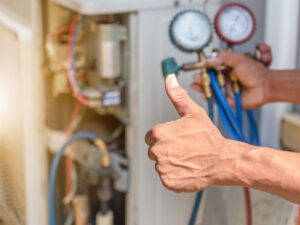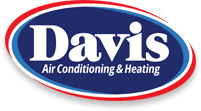How Your HVAC System Can Help Reduce Your Exposure to Asthma Triggers
Asthma triggers are circumstances or events that cause an asthma attack or worsen asthma symptoms. You’ll find asthma triggers both inside the home and outdoors. The HVAC system in your Clute, Texas, home can help reduce your exposure to harmful asthma triggers.
Preventing Dust Circulation
Dust is an irritant that can serve as an asthma trigger and reduce your home’s indoor air quality. You’ll find it on the smooth surfaces of your home, as well as in your carpets, upholstery, draperies, and even air ducts. You can also get exposed to dust outdoors, but indoor air typically serves as the primary culprit.
Your HVAC system circulates warm and cold air throughout your home, depending on the seasons, but you don’t want motes of dust to arrive with each stream of air through your vents. Fortunately, the air filter helps capture dust and prevent it from getting distributed throughout your rooms. Using a high-quality filter and changing it regularly will increase the amount of dust it traps.
Discouraging Dust Mite Infestations
Not only can dust mites trigger asthma symptoms, but the American Lung Association reports they can also cause asthma among otherwise healthy adults and children. You can’t see dust mites — they’re microscopic bugs that belong to the spider family — but most homes have them. High dust-mite activity can inhibit your respiratory system.
There are several ways to prevent dust mites, such as using mattress and pillow covers and having your carpets and rugs steam cleaned. However, your HVAC system helps to discourage their activity, too. Since mites need moisture to survive, running your HVAC system will reduce humidity levels in your home so mites can’t live.
Your air filter also helps. Since dust mites are so small, their fecal matter can become airborne. The air filter attracts those particles and prevents them from re-entering your home’s air.
Moderating Indoor Humidity Levels
Speaking of humidity, when the moisture content in the air is too high or too low, your asthma symptoms might worsen. This is particularly true for high humidity because moisture allows certain other asthma triggers to thrive, such as mold and mildew. The spores enter your respiratory system and irritate it. Additionally, high levels of heat can leave you unable to catch your breath, which is why heat and humidity are often mentioned in the same sentence.
Your HVAC system helps control humidity. Each time your air conditioner or furnace cuts on, it cycles air throughout your home, which reduces humidity levels. This is the reason you might experience relief as soon as you go inside after you’ve spent time outdoors in a humid environment.
If your home suffers from high humidity levels despite the existing HVAC infrastructure, consider having us install a whole-home dehumidifier. This appliance works in concert with other HVAC appliances to keep humidity levels under control. It’s particularly beneficial in hot, humid climates like you find in the Houston area.
Neutralizing Bacteria and Virus Particles
Respiratory illnesses, such as those caused by bacteria and viruses, are uncomfortable for everyone. However, they hit asthma sufferers the hardest because they can trigger symptoms and even cause asthma attacks. Prolonged illnesses can make the symptoms even worse because your system never has a chance to recover.
HVAC products like air cleaners, however, can neutralize bacteria and virus particles. Also called “air purifiers,” these devices attract harmful and irritating particles, then render them harmless through electrical charges. The electricity bursts the particles’ cell walls so they can’t continue to wreak havoc in your home.
Air cleaners are also useful for tackling other asthma triggers, such as pollen and mold spores. Our trained technicians can install an air purifier in your home so you don’t have to worry about asthma flare-ups or attacks as often.
Other options include UV lamps, which we install on the indoor coils of your HVAC system. The UV light is extremely effective at neutralizing pathogens and keeping your family safe from germs. Mold and bacteria are particularly vulnerable to UV light.
Monitoring Carbon Monoxide Levels
People who suffer from asthma are especially vulnerable to carbon monoxide in the home. Carbon monoxide is a dangerous gas that can poison humans and animals. You can’t detect it through touch, taste, or smell, and its toxicity can result in serious respiratory distress and failure, as well as other negative consequences.
When we visit your home for your next HVAC tuneup, ask us about our range of carbon monoxide detectors. These devices alert you to dangerous levels of carbon monoxide in your home, which will protect your family and give you peace of mind.
Install a carbon monoxide detector near your bedroom so you’ll hear it if the alarm goes off in the middle of the night. Keep the detectors out of direct sunlight and away from your HVAC system vents for maximum effectiveness.
Removing Chemical Odors
Common household products, from cleaning supplies to furniture upholstery, can give off harmful fumes that trigger asthma symptoms. In fact, any strong odor — from paint thinner to perfume — can lead to an asthma attack if you don’t isolate yourself from it. Your airways get irritated and you find it difficult to catch your breath. Chemical odors can also cause sneezing and coughing fits that are difficult to stop once they start.
By themselves, your HVAC appliances help remove chemical odors from the home, especially if you use a high-quality air filter. However, you can also use air cleaners, UV lamps, and other add-on appliances to protect your family further from harsh odors.
Closing Off the Outdoors
It’s tempting to fling open the doors and shove up the windows when the weather is nice. However, exposing yourself to the outdoors — especially during the mild seasons — can prove hazardous to your health if you suffer from asthma. During the spring and fall, pollen levels rise and other irritants can be carried into your home on a fresh breeze.
With a properly maintained HVAC system, you don’t have to create a hazardous environment. Keep your home closed and allow your air conditioner or furnace to maintain the most comfortable temperature in your home. Of course, you can’t live your entire life inside, so when you step outdoors, keep your activity level low if you suffer from exercise-induced asthma and wear a face mask if necessary to keep irritants at bay.
Reducing the Impact of Weather Changes
You might have noticed that your asthma acts up when the temperature suddenly drops or rises. You might also experience more symptoms after humidity changes. This is because weather patterns influence your respiratory system. Drastic changes can disrupt the way your body processes oxygen and maintains your airways.
When you use your HVAC system correctly, you don’t have to experience the full brunt of sudden weather changes. Maintaining consistent temperatures on your thermostat will help you breathe easier and avoid the discomfort of respiratory distress.
You can further protect yourself by bundling up in the winter and drinking plenty of fluids in the summer every time you go outside. Avoid exerting yourself too much during the summer, and go inside if you get uncomfortable.
Filtering Smoke and Pollution
Both smoke and pollution can prove disastrous for your health if you suffer from asthma. Both pollutants can irritate your airways and cause coughing fits. Moreover, long-term exposure can make your asthma symptoms worse every day. This is especially true during certain times of the year. For instance, in the winter, people often light fires in their fireplaces. The smoke travels throughout the neighborhood and can penetrate your home without proper filtration.
Running your HVAC system allows you to keep the doors and windows shut. Depending on your HVAC setup, your air filter, air cleaner, or UV lamp will neutralize any pollutants that enter your home. Make sure to avoid introducing pollutants, such as tobacco smoke, into your home.
Asthma can be difficult to manage and control, but your HVAC system helps keep your symptoms at bay. If you’re interested in installing an air cleaner, UV lamp, or other HVAC appliance, give Davis Air Conditioning and Heating a call at 888-710-5530. We’re happy to help make your home as safe as possible.
Image provided by Shutterstock
You May Also Like

Is My Heat Pump in Fort Bend, TX, Low On Refrigerant?
Your heat pump hums through the cool January mornings in Fort Bend, TX, but something feels off. The air trickling from your… Continue Reading Is My Heat Pump in Fort Bend, TX, Low On Refrigerant?…

How Often Should I Change My HVAC Filter in Pasadena, TX?
The crisp winter air sweeping across Galveston Bay might feel refreshing outdoors, but inside your Pasadena, TX, home, your HVAC system works… Continue Reading How Often Should I Change My HVAC Filter in Pasadena, TX?…

Should I Repair or Replace My Furnace in Houston, TX?
The mercury’s dropped, your furnace is making strange sounds, and you’re wondering whether to nurse it back to health or send it… Continue Reading Should I Repair or Replace My Furnace in Houston, TX?…
